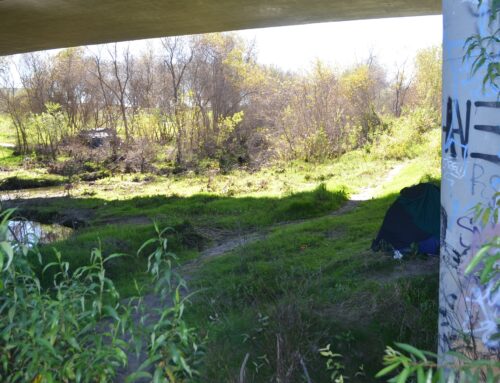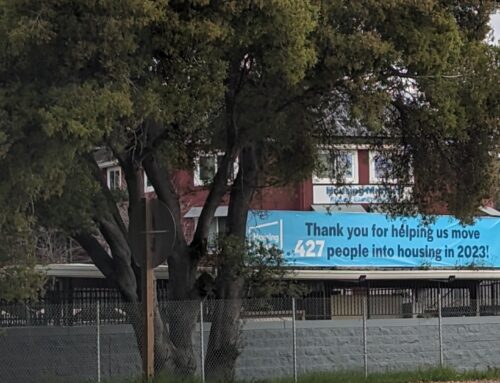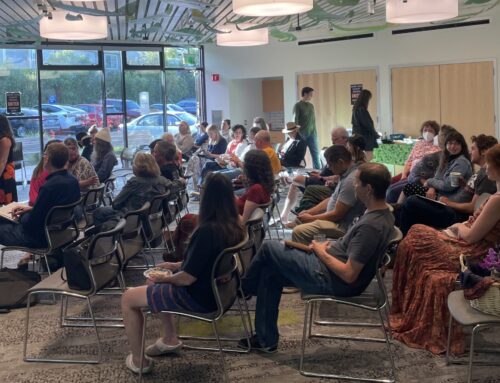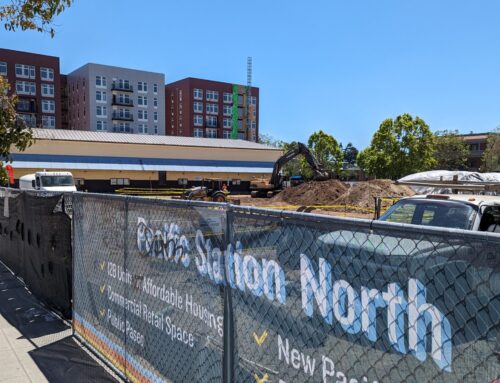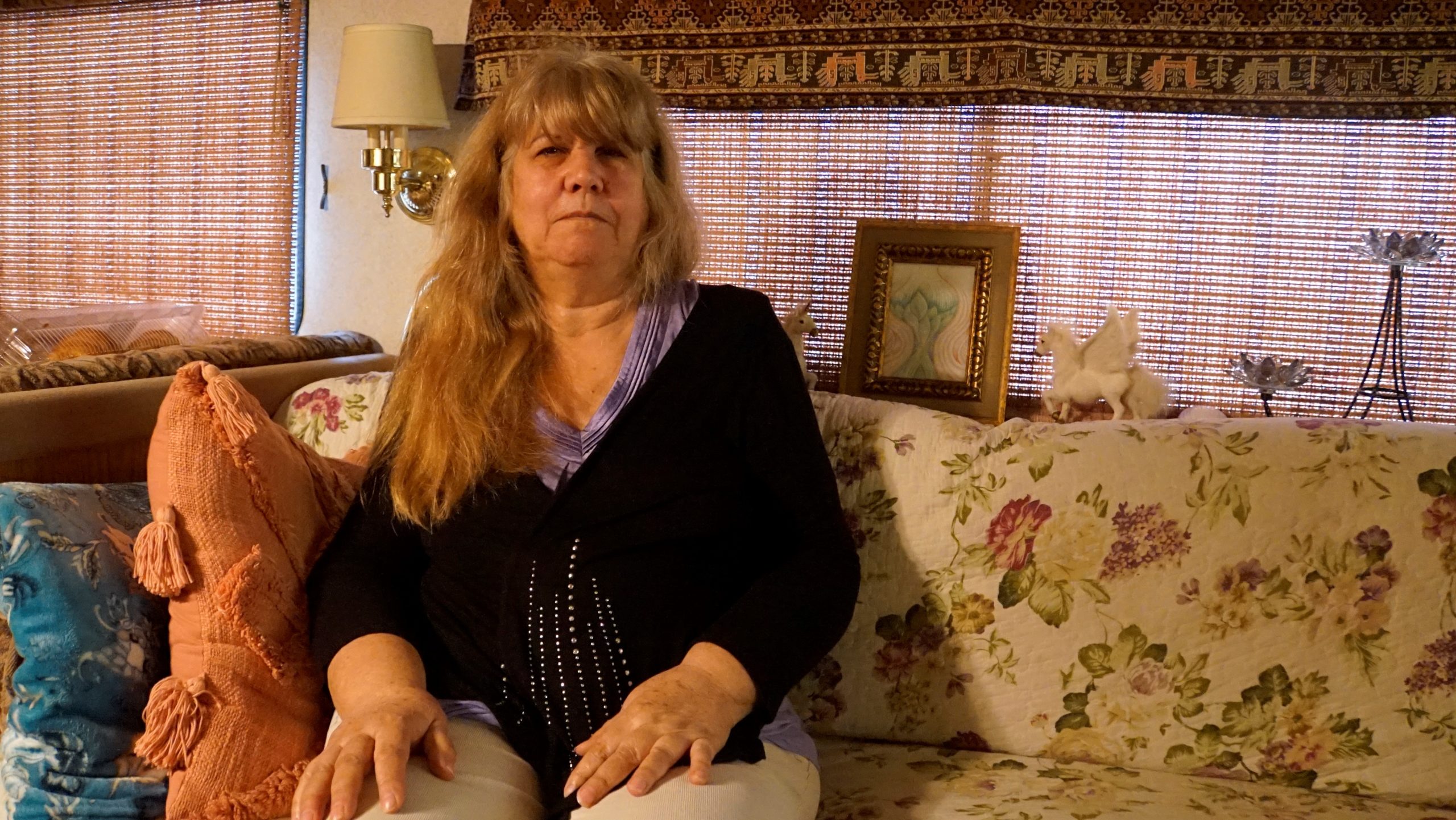
Silvana Hay, 65, grew up in Santa Cruz and now lives in her RV in Santa Cruz. (Kara Meyberg Guzman — Santa Cruz Local)
Why we wrote this story: When we write about big decisions in local government, we want to hear from people most affected by those policies.
SANTA CRUZ >> Silvana Hay, 65, said her dream is to get a housing voucher and find a stable apartment in Santa Cruz.
“That’d be fine,” Hay said. “I don’t have dreams, goals and hopes like I used to.”
Hay grew up in Santa Cruz and lived in apartments around Santa Cruz County until she became homeless in 2010. Hay was a caregiver and could not find enough work to afford rent. She began to sleep in her car. Years later, she got an RV. Now, she lives on a fixed income from disability insurance. She hopes to get off the waitlist for a Downtown Santa Cruz mobile home park for people with low incomes.
Hay was one of several RV owners parked on Encinal Street in Santa Cruz’s Harvey West neighborhood on Tuesday. She is one of many people who live in their RVs who will be impacted by new limits on overnight parking adopted by the Santa Cruz City Council on Tuesday. The law takes effect Dec. 9.
The proposal by Vice Mayor Sonja Brunner and council members Shebreh Kalantari-Johnson and Renee Golder includes:
- A requirement for overnight parking permits for oversized vehicles. Residents’ permits would be valid for one year and allow the vehicle to be parked in a spot for 72 hours four times a month. Vehicles must be parked next to the resident’s home, or if that spot is not available then within 400 feet. Residents can buy up to six visitor permits per year for out-of-town guests. Visitor permits would be similar but valid for 72 hours.
- “Oversize vehicles” are vehicles or trailers at least 20 feet long. Vehicles that are at least 8 feet tall and 7 feet wide also are considered oversize.
- Resident permits are available to people who primarily live at a street address in the city of Santa Cruz or own land with a street address in Santa Cruz. An RV owner must have a permanent address in the city to get a resident or visitor RV permit. Post office box addresses do not count as street addresses.
- Without a permit, RV parking generally would not be allowed on streets, alleys or city lots 12-5 a.m. The limits would not apply to emergency situations such as mechanical breakdowns. The limits also would not apply to commercial vehicles with the oversize vehicle parking permits. Fines would be set for violations.
“Oh God, I guess we’re doomed,” said Hay, the RV owner, when she heard the details of the proposal. She has a post office box, but no permanent street address, so she will not be able to buy a parking permit. She said she didn’t want to comment at the online city council meeting because she had “little faith” that she would be heard.
The new law came in response to many hundreds of Westside residents’ concerns about trash, waste and crime related to people who live in their vehicles. “I can see their point,” Hay said of the complaints about trash. “I hate it too.”
Hay said she thinks more dumpsters in areas where RV drivers park would help the problem. She tells drivers who litter to pick up their trash, and when they don’t she uses a pickup tool to clear it herself. Drivers who litter are “making it hard on me,” she said. “I’m categorized with all the rest.”
Hay often parks in Harvey West or on Delaware Avenue on the Westside. She said she has not tried to enroll in a safe sleeping program since those programs require drivers to move each morning.
“It’s back and forth, back and forth. I don’t have money for gas. All my money is going for gas. I’m not kidding. It’s hundreds of dollars a month,” Hay said.
Hay said since her RV takes up two parking spaces, she gets $50 parking tickets almost monthly. She said she pays her tickets despite her limited income. She can’t afford to have her RV impounded, she said.
Council vote on RV rules
Tuesday, the council voted 5-2 to adopt the law. Brunner, Kalantari-Johnson, Golder, Mayor Donna Meyers and Councilmember Martine Watkins were in favor. Councilmembers Justin Cummings and Sandy Brown opposed it.
Cummings said city policy should address “problematic RVs” rather than all of them. “But this ordinance really targets any vehicle over 20 feet, even those people who are not problematic or homeless,” Cummings said.
Kalantari-Johnson said the law is “the first step.” She said, “I’m hopeful that we will be moving forward with a services-oriented approach and we will get folks into a pathway to housing, which is ultimately what we want to be working towards in everything that we do.”
Santa Cruz resident Hollis Molloy spoke in Tuesday’s meeting to express his support for the law.
“There is a huge distinction between the unhoused and these problem RVs that the police and the Westside are dealing with right now,” Molloy said. “People who simply are in their vehicles living unhoused do not get the police called on them. They do not disrupt public peace and they are not the issue we are complaining about. What we are complaining about is the problem RVs. That is drunk and disorderly conduct, child endangerment, environmental issues.”
Safe sleeping expansion
With the limits to RV parking, Kalantari-Johnson, Brunner and Golder last month also proposed an expansion of the city’s safe parking programs for people who live in their cars. Their proposal, approved by the council Oct. 26, includes:
- The addition of three safe overnight parking spaces. These spaces will be added by Dec. 9 to the Santa Cruz Police Department parking lot at 155 Center St., city staff has said.
- At least 30 additional overnight parking spaces on city-owned or non-residential land by March. In a memo Tuesday, city Homelessness Response Manager Larry Imwalle wrote that city staff are reviewing city-owned parking lots that can accommodate four to six vehicles with security. That approach would cost more than a program at a single site, but would likely incur fewer complaints from neighbors, Imwalle wrote. Pushback from neighbors has stymied several other attempts to establish safe sleeping programs. The annual cost estimate for about 30 spaces is $193,000, according to the memo.
- A robust safe parking program with connections to service providers and county partners. The annual cost estimate for 30 overnight spots in a city-owned lot with a hired operator is $380,000, according to Imwalle’s memo. A timeline has not been announced.
Separately, Deputy City Manager Lee Butler announced Tuesday that city staff are working to create more sanctioned homeless camps. A recent city law that limits where and when people can camp requires the creation of a storage program and 150 safe sleeping spaces for the limits to take effect.
Four safe sleeping program locations are in the works, Butler said:
- National Guard Armory in DeLaveaga Park: Staff recommend a 24-hour program with outdoor tents on a lawn for 75 people. Ten of the sleeping spaces would be overnight only with placements by police and service providers. The estimated annual cost is $2.5 million, according to Imwalle’s memo. A 24-hour program offers more stability and is more likely to result in connections to housing than an overnight-only program, Butler said.
- A city-owned lot at 1220 River St. and at a location yet to be determined: Staff plan for two tent camps for 60 to 80 people, with staff, connections to services and “health and hygiene infrastructure,” Imwalle wrote. Estimated annual cost is $402,000.
- Benchlands by the county government building: The city already manages a tent camp at this location. City staff propose continuing part of the camp north of the San Lorenzo River pedestrian bridge. Estimated annual cost is $605,000.
Ongoing funding sources for these programs have not been identified.
Read Santa Cruz Local’s related stories:
- “Overnight RV parking limits advance in Santa Cruz” (Oct. 26, 2021)
- “Overnight parking limits debated in Santa Cruz” (Sept. 22, 2021)
- “Homeless camp limits approved in Santa Cruz” (June 9, 2021)
Kara Meyberg Guzman is the CEO and co-founder of Santa Cruz Local. Prior to Santa Cruz Local, she served as the Santa Cruz Sentinel’s managing editor. She has a biology degree from Stanford University and lives in Santa Cruz.


